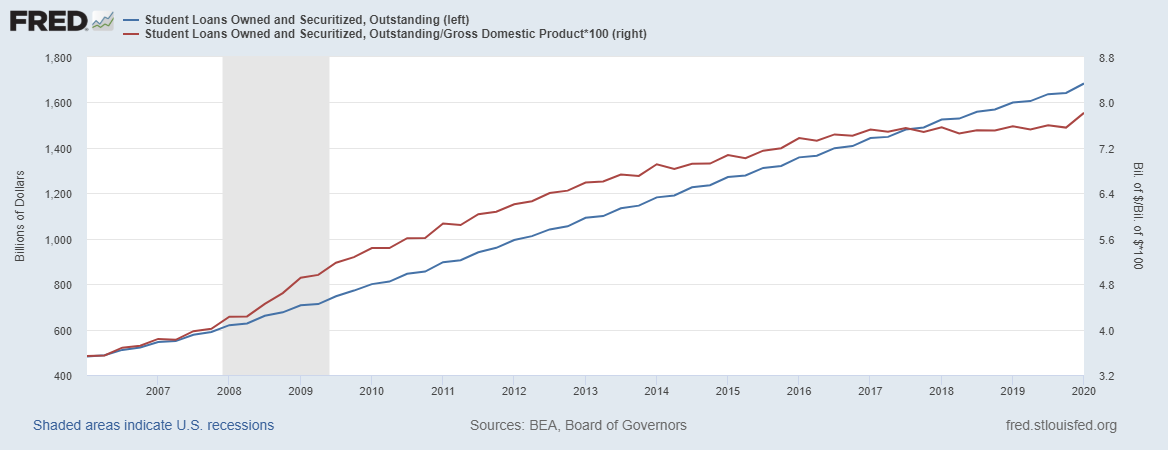[et_pb_section fb_built=”1″ _builder_version=”4.16″ _module_preset=”default” custom_padding=”43px||43px||true|” global_colors_info=”{}”][et_pb_row _builder_version=”4.16″ _module_preset=”default” global_colors_info=”{}”][et_pb_column type=”4_4″ _builder_version=”4.16″ _module_preset=”default” global_colors_info=”{}”][et_pb_text _builder_version=”4.18.0″ _module_preset=”default” hover_enabled=”0″ global_colors_info=”{}” sticky_enabled=”0″]
The phrase student loan forgiveness has been a buzz word the past few years. Recently, it has gained traction in the news with Biden’s delay of student loan payments and elected officials calling student debt a crisis. I call the entire conversation insulting and a gross abuse of government power.
Merriam-Webster provides several definitions that are necessary for this discussion:
- Forgive – to grant relief for payment of
- Student – one who attends a school or one who studies
- Loan – money lent on interest
The definition of “forgive” provided is specifically concerning finances. The first definition is “to cease to feel resentment towards an offender.” Every other definition of loan contains the word temporary. Looking at these definitions and the student loan forgiveness proposals, it’s clear we’re being lied to.
The first issue is who is considered a student. Title 34: Education in the Code of Federal Regulations has no definition for student. Title 29: Labor defines “student-learner” but only under the context of how to legally pay someone below minimum wage if they are a student. Instead, the “definition” of a student is left to be inferred from policy explanations. There’s a subjective belief system amongst government officials that an accredited degree from a four-year college or university is synonymous with the definition of student.

What a slap in the face to every person who has wanted to learn a skill, only to be forced to complete government mandated education and occupational licensing.
Truck drivers, cosmetologists, auctioneers, morticians, real estate agents, and pest control technicians are just a few examples of professions that require some form of government license and education with no degree. Certainly individuals who choose these professions can be considered students.
Add to this the list of trades that require minimal formal education and robust apprenticeships, yet are often discounted in the definition of student.
- Electricians
- Plumbers
- Auto Mechanics
- Welders
- Veterinary Technicians
- HVAC
- Dental Hygienists
- X-ray Technicians
- IT Workers
- And more
The second issue is who qualifies for forgiveness? When the government began mandating business operations and closures, careers that the government deemed essential were thrust into the spotlight. Careers that directly touched on services and functionality of society were heralded as heroes. Truck drivers and those involved in the supply chain were on national news. People flocked to barber shops after botched haircuts from YouTube videos. If your power went out or a pipe burst, electricians and plumbers took extra precautions and made it a point to get the job done.
Then there are students at four year colleges and universities who worked during their education to avoid student loans. They dutifully attended courses while rushing to and from their next shift or day at the office. Some of those individuals even attended school part-time to avoid taking on debt. They may not have the highest GPA or graduated at the five or six year mark, but they slogged through their education with a dedication to fiscal responsibility.
But forget those people, right?
People who took out tens of thousands of dollars to attend a four-year university for a degree are who the government says to forgive. For some the debt looms in the hundreds of thousands of dollars. There may be multiple degrees, out-of-state tuition charges, a lengthier stay due to a change in major, or tuition that was exceptionally high due to extreme specialization in a field. Maybe the loan recipient didn’t work, bought a new car, or went on vacation during school.
And who is forgiving these loans? People who made sacrifices in their lives specifically to avoid being saddled with student loan debt today.
The problem with this system isn’t just that the government is redistributing wealth. It is rewarding individuals who took no financial responsibility and specifically took on contractual debt with no clear path to be able to repay. It’s hurting individuals who made intentional decisions to avoid debt, even if it meant more work or a longer completion time for a degree.
Above all, the student loan forgiveness system will force taxpayers to pay for the value of a lone paper degree and ignore the value of an investment in education.
Anyone who took out a loan to pay for a semi truck, welding equipment, or tools for a trade position are without a doubt making an investment in their education and taking on debt to do so. Many have paid their loans back and, if they haven’t, there’s an understanding and a path to pay them off. Now, if student loan forgiveness is implemented, they will be required to pay for everyone else too.
[/et_pb_text][/et_pb_column][/et_pb_row][et_pb_row _builder_version=”4.16″ _module_preset=”default” global_colors_info=”{}”][et_pb_column type=”4_4″ _builder_version=”4.16″ _module_preset=”default” global_colors_info=”{}”][et_pb_text _builder_version=”4.16″ _module_preset=”default” global_colors_info=”{}”]
If you liked this article, please sign up for the People For Liberty newsletter to be kept up to date on our efforts to promote the #LibertyLifestyle and #ConsentCulture.
[/et_pb_text][/et_pb_column][/et_pb_row][/et_pb_section][et_pb_section fb_built=”1″ _builder_version=”4.16″ global_colors_info=”{}”][et_pb_row _builder_version=”4.16″ background_size=”initial” background_position=”top_left” background_repeat=”repeat” custom_margin=”-120px|auto||auto||” custom_padding=”54px|||||” global_colors_info=”{}”][et_pb_column type=”4_4″ _builder_version=”4.16″ custom_padding=”|||” global_colors_info=”{}” custom_padding__hover=”|||”][et_pb_text _builder_version=”4.16″ background_size=”initial” background_position=”top_left” background_repeat=”repeat” global_colors_info=”{}”][/et_pb_text][et_pb_code _builder_version=”4.16″ _module_preset=”default” custom_margin=”-103px|||||” custom_padding=”55px|||||” global_colors_info=”{}”][gravityform id=”2″ title=”false” description=”false” ajax=”true” tabindex=”49″ field_values=”check=First Choice,Second Choice”][/et_pb_code][/et_pb_column][/et_pb_row][/et_pb_section]
